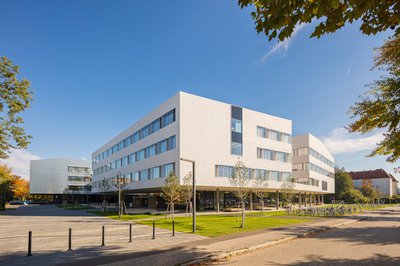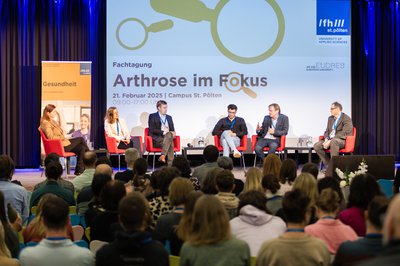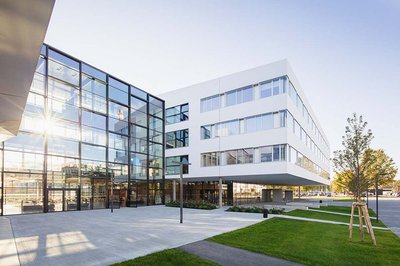Physiotherapy
Bachelor programme
More courses from the department
Health SciencesWide-ranging Career Options for highly-skilled Experts
Physical movement plays a crucial role in human development. On the physiotherapy bachelor programme, students learn how to restore and improve movement, while taking patients’ individual needs and social requirements into account. The strong practical focus ensures that graduates possess a comprehensive skill set and extensive expertise.

Events
News

New Academic Directors
Starting from this semester, three new Academic Directors apply themselves to exciting tasks in the Faculty of Health and Social Sciences

Spotlight on Arthrosis
St. Pölten UAS Held First Symposium and Info Day on the Topic of Arthrosis

More Study Places in Healthcare
10 More Study Places for Physiotherapy and Another 50 for the Continuing Education Programme Preclinical Treatment and Care at the St. Pölten UAS
FAQ
How can I prepare for the three-stage admission procedure?
Stage 1: A computer-assisted test evaluates the candidates’ linguistic, spatial, mathematical, and logical thinking as well as memory performance. It is a good idea to train complex text comprehension, interpretation of information, and basic mathematics. Likewise, exercise your spatial thinking, pattern recognition, logical problem-solving skills, and information abstraction using available online resources and exercise books. The test has a duration of approx. 90 minutes.
Stage 2: Candidates who have passed the written test are admitted to a profession-specific aptitude test which includes practical tasks to test coordination, dexterity, tactile and visual perception, roleplay, didactics, and spatial thinking. Train your body awareness and spatial perception and hone your communication skills in interacting with people. All in all, the tasks in individual stations will take about 20 minutes.
Stage 3: The aptitude test is followed by a structured personal admission interview of roughly 20 minutes. Be prepared to explain your motivation for this degree programme and your knowledge about the profession of physiotherapy. On the St. Pölten UAS’ website, you can obtain information about projects in the study programme Physiotherapy and about the campus in general.
Where do the vocational internships take place?
The vocational internship represents a valuable opportunity to acquire subject-specific and methodological knowledge and physiotherapeutic skills in a professional setting in various health facilities, mostly in Lower Austria (NÖ). During an internship, you are going to apply the physiotherapeutic process under supervision in various specialist areas.
You can complete your internship in the following fields:
- Psychiatry and geriatric medicine
- Paediatric medicine
- Orthopaedics/traumatology
- Neurology
- Internal medicine, cardiology, and pulmonology
In addition, there are further elective areas where you can deepen your knowledge: surgery, intensive care, oncology, gynaecology and obstetrics, sports physiotherapy, and health promotion. In the 6th semester, students also have the opportunity to complete their internships abroad.
Can I participate in research and practice projects during my studies?
Within the framework of bachelor theses and project work, students can get involved in our research projects in their 5th semester. Moreover, they can gain insights into research projects as voluntary test persons or student assistants. At the moment, we have the following ongoing projects in the focus area Physio Science of our Institute of Health Sciences:
- The project NUMOQUA is dedicated to improving the quality of life of patients with knee osteoarthritis. It examines the effects of the programme “GLAD® (Good Life with osteoArthritis)” in combination with a special dietary programme.
- Another project, DICHTE, explores the training of healthcare teams with digital assistance and interprofessional collaboration. It investigates how digital methods can be used to improve the integration of the patient into interprofessional learning.
- GLAD® Austria implements international best practice guidelines for the treatment of patients with knee and/or hip osteoarthritis. This programme is carried out by certified physiotherapists and encompasses both standardised counselling and exercise programmes and scientific analysis for quality control.
When it comes to the student projects in the 5th semester, the students implement practical healthcare projects in small groups and present their results at the Projects Vernissage of the St. Pölten UAS. The topics are manifold and include, for example, workplace health promotion, digitalisation, public relations work, diversity, etc.